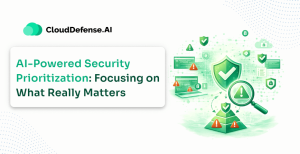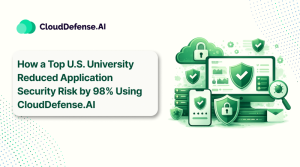What is Internet Security?
Internet security is a cybersecurity measure that is implemented to manage and protect data and online activities from threats associated with the internet, web browsers, apps, and networks. The primary aim of internet security is to safeguard the users, devices, and all the organization’s IT assets from all kinds of threats and attacks lingering on the internet.
It encompasses a wide variety of technologies, strategies, practices, protocols, and techniques, including firewalls and encryption, that protect online activities and sensitive organizational information from all kinds of threats.
Most importantly, this practice serves as a component of larger domains like cybersecurity and system security as it covers network security, online behavior, and browser activity. It involves constant monitoring, enforcing policies, following best practices, and updating protocols to safeguard the organization from threats whose main aim is to compromise financial data, personal data, and other assets.
Nowadays, most organizations utilize the Internet for all forms of communication, and a lot of sensitive information is shared, so inevitably, internet security has become a top priority for everyone. With internet security, organizations prepare to avert many modern threats like phishing, malware, and social engineering attacks.
Internet Security Importance in Today’s World
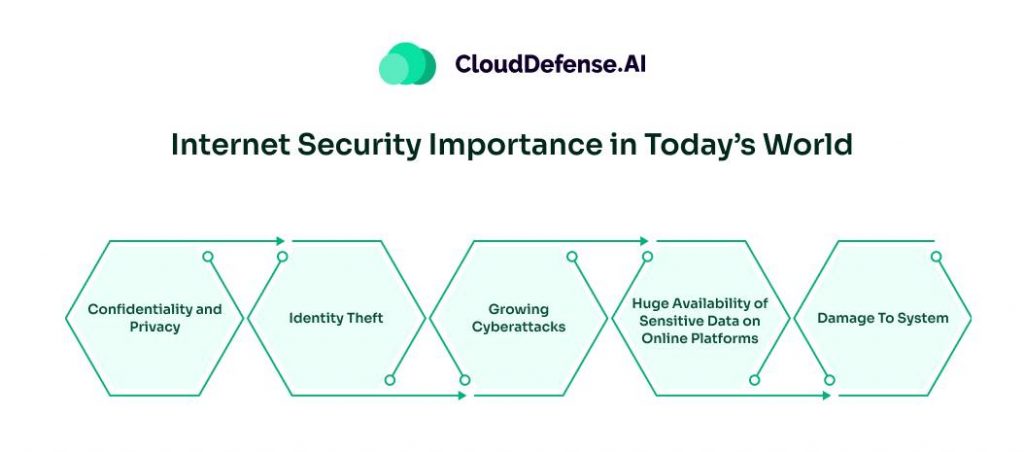
In today’s time, organizations rely largely on the Internet for facilitating their business operation. The rapid adoption of remote work has also made the Internet a vital commodity.
However, the heavy reliance on the internet has also made organizations and their users exposed to an increasing number of cyberattacks delivered over the internet. Here are some vital reasons that make internet security important in today’s time:
Confidentiality and Privacy
For all the sensitive information, confidentiality and privacy is of vital importance but these data can be vulnerable when security protection is not in place. Attackers can launch malware, identity theft and other attacks to steal the data. Many organizations and government agencies store a lot of sensitive data especially of finance and personal information to carry out their daily operation.
Identity Theft
With the increase in the use of web applications and information being exchanged on online platforms, identity theft has become a widespread issue. When the organization is not protected sufficiently, it can result in the theft of user credentials, credit card details, PII, social security numbers, and many others.
Attackers can use this information to make any purchase, apply for a loan, get into a web application to steal data, and perform many other malicious tasks.
Growing Cyberattacks
Another reason that makes internet security an important aspect is the growing number of cyberattacks. No matter the business, organization are constantly under the threat of cyberattacks and they always look to attack top-executives as they have access to most of the sensitive information.
Huge Availability of Sensitive Data on Online Platforms
The rapid shift of enterprises from on-premises to cloud platforms and increase in digitization, most of the data including sensitive information are stored in the cloud. However this trend has also caused the attacker to move their focus on cloud platforms operating on the internet. Attackers are constantly looking for ways to exploit vulnerabilities and get into cloud storages.
Damage To System
Endpoint systems like laptops, desktops, and other devices that are connected to the internet for various operations are always targeted by attackers. Even though most of the attackers launch attacks to steal data, there are cyberattacks that want to damage the system or jeopardize business continuity.
Attackers mostly use viruses, trojans, and malware to destabilize the device and interfere with services and communication performed by the endpoint devices.
What are the Common Internet Security Problems?
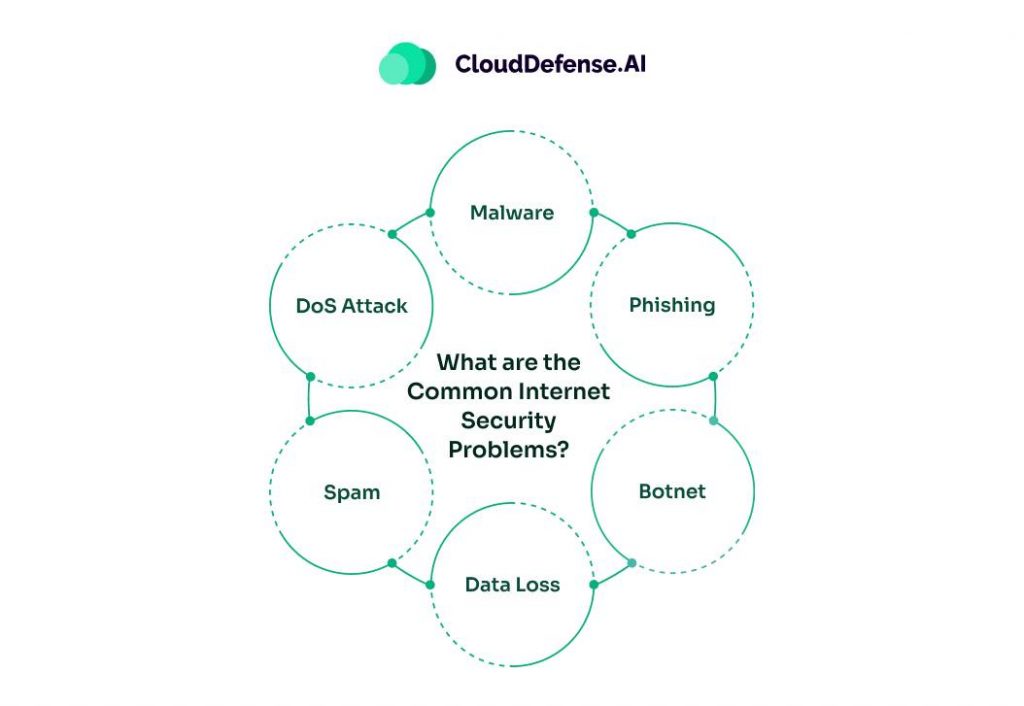
Internet security is marred by numerous internet security problems that impact the organization in many ways. These common internet security problems are:
Malware
Currently, malware serves as one of the best choices for attackers to deliver malicious code through compromised email or websites. Malware compromises a variety of viruses, worms, and other malicious tools, and attackers use them to encrypt data, hijack the system, or take other actions that impact the network. Malware is delivered over the internet using various techniques, and it is targeted at endpoints or top officials of the targeted organization.
Phishing
Apart from malware, a common security problem that has also affected internet security is phishing. It has emerged as the widely used delivery mechanism for delivering malware.
Phishing emails are crafted in such a way that they trick users at endpoints into thinking they come from a legitimate source, and once the user clicks on the link or downloads the attachment, the malware gets delivered. Due to this, it has become a popular social engineering attack for stealing information.
Botnet
Botnet is a serious issue that has been affecting internet security for years. Botnets create a network of devices that are infected with specific malware, which allows attackers to use the resources to automate any illicit action. Botnets are often utilized to download malicious programs and infect a series of devices with the same malware while propagating over the network.
Data Loss
Organization’s data , especially sensitive customer information, serves as the primary target of most cybercriminals. Data is stolen over the internet in different ways and it also happens during data communication or transmission. When a network is infected with any kind of malware, it enables the attacker to easily steal data and use it for malicious purposes.
Spam
Spam is another common internet security problem that has been creating issues for security administrators. Spams are basically unwanted emails that are mostly promotional but attackers often use it to deliver malware.
If any of the employees accidentally open a spam mail with a malicious program in the endpoint device, it infects the whole network and enables the attacker to launch other attacks. Spams can also clog up the inboxes and hamper the workflow of users at endpoints.
DoS Attack
A denial of service or DOS is a common issue with internet security where the cybercriminals flood the network with numerous requests, rendering the network to become slow or unavailable for users. DoS attacks are launched through various means, often exploiting vulnerabilities or gaps in the security. DDoS attacks are often launched to affect multiple systems.
Emerging Trends and Challenges in Internet Security
With modern technologies growing rapidly and attackers getting sophisticated with their attacks, internet security is also evolving accordingly. The rapid adoption of the remote working model is complicating the internet security processes.
Unlike centralized systems in offices that are protected by various security offices, endpoints used for remote working are highly vulnerable. Since they lack robust security measures and monitoring facilities, attackers widely target them through various means.
The addition of IoT devices to the network has brought a high shift in the market, but it also widened the attack vectors. Not all IoT devices come equipped with necessary security measures, and this makes them vulnerable to attack, ultimately impacting the network.
The emergence of AI in internet security and cyberattacks has also changed the dynamic of security measures to protect the assets and data on the internet. Attackers are using AI to automate most of the attacks and develop sophisticated malware. In contrast, cyberattacks are using AI to proactively detect and mitigate threats and also identify potential issues.
Organization that use the internet for managing their supply chain are facing an increase in the number of attacks. Usually attackers are targeting the supply chain to jeopardize the service and it not only affects the operation of a particular business but also other organization associated with it.
What are the Benefits of Internet Security Solutions?
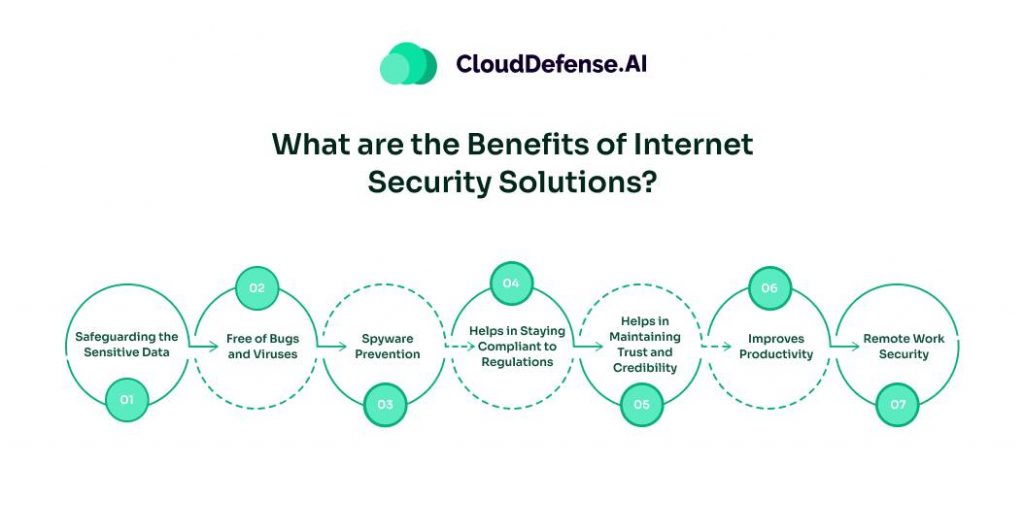
When you implement an internet security solution in your security infrastructure, it offers you countless benefits. Businesses that rely on the Internet to facilitate their daily operation will largely benefit from the solution. Let’s explore the benefits it has on offer:
Safeguarding the Sensitive Data
Organization dealing with sensitive data, especially customer information, are constantly under threat from various types of attacks. Internet security helps in protecting the data especially during online communication and ensures attackers can’t breach the system or web browser to steal data.
Free of Bugs and Viruses
Systems at the endpoints that use the internet for performing various business tasks often face bugs and viruses in the systems. It infects the system in various ways and enables attackers to perform various malicious tasks. However, an internet security solution reduces the chances of bugs and viruses in the devices and ensures attackers can’t exploit any vulnerability to deliver viruses.
Spyware Prevention
Internet security is highly effective when it comes to preventing spyware that enters your system, especially endpoints, and stays hidden to monitor all the activities. The spyware is delivered to intercept and steal sensitive data, especially financial information that includes bank details, online transactions, and many others. However, internet security prevents spyware from infecting the system or carrying out malicious tasks.
Helps in Staying Compliant to Regulations
Many organization have stayed compliant to regulations like HIPAA, GDPR, SOC II, PCI DSS and others that provide requirements for organization to protect user data. By preventing infection of malware and keeping all the data safe, internet security helps organization to comply with all the regulation requirements and avoid penalties.
Helps in Maintaining Trust and Credibility
Internet security takes the necessary security measures and policies that prevents attackers from breaching the security perimeter of an organization. Breaches usually cause disruption in business operations that impact the reputation and credibility of the customers and investors. When an organization maintains robust internet security, it enhances their trust and credibility in the market.
Improves Productivity
Viruses, bugs, and malware negatively impacts the overall productivity of the business workflow, network and functioning. When a security breach or malware attack happens, it disrupts the whole business which leads to severe downtime. However, with the implementation of internet security, organizations can take necessary steps to safeguard the system and improve overall productivity.
Remote Work Security
As the number of remote devices increases with time, it has become important for organizations to enforce necessary security measures to secure the data and system while maintaining productivity. Internet security plays a major role in protecting remote devices and making sure it has the necessary security perimeter to prevent any kind of threats.
What is the Differences Between Cyber Security and Internet Security
While navigating the landscape of internet security, people often get confused and consider it similar to cyber security. Even though they have the same goal of protecting the organization, there are subtle differences between the two.
Internet security is all about protecting the device and network along with the data in it using both software and hardware. It specifically addresses threats, bugs, and viruses associated with internet-based systems and data communication.
On the other hand, cybersecurity refers to the security measures that are implemented to protect the network and data of organizations or individuals from cybercriminals. It has a broad scope that covers various cybersecurity measures, technologies, protocols, policies, tools, and many more.
While the primary purpose of internet security is keeping the data secure and preventing infection of the devices. Viruses and worms can jeopardize productivity or workflow, which ultimately impacts overall business continuity, so internet security prevents such issues from impacting the systems, especially endpoints.
The main aim of cybersecurity is not only to protect the network but also prevent threats infecting the whole infrastructure and stealing sensitive data. At its core, cybersecurity is designed to build a robust security system that would protect your system, network and infrastructure from cyber attacks.
Is Internet Security the Same as Antivirus Software?
Going by details of internet security, a query might pop up: is the internet the same as antivirus software? Well to answer your query in short we can say they are slightly different from each other but they share the same primary goal to secure the digital identity and system from threats.
Internet security serves as the overall security measure that secures all your internet activity and protects the whole system. It is designed to secure your presence on the internet. Whereas antivirus software serves as a part of security strategy that is intended to protect your system malware, virus, worms, bugs and others.
It acts as a digital security that protects the inner area of your system, while internet security serves as a guard that creates a secure perimeter and assesses every activity you perform on the internet.
Internet security comprises a different security approach which includes encryption, firewall, policies, and security technologies. All the internet security measures work together to ensure a secured interaction on the internet and prevent any unauthorized users getting entry into your system. It is primarily concerned with the threats that are present on the internet and ensures none of the threats can infiltrate your network or system.
While internet security takes care of threats on the internet, antivirus software makes sure your system is completely free from malware or any malicious software that can comprise the whole system. It continuously monitors your system and looks for signs of any malicious activity or threat.
When you install an antivirus in the endpoint of your network or any system, it acts as a digital security that uncovers the presence of threats and mitigates them. However it doesn’t secure your activity on the internet or let alone prevent the entry of threats when you interact with websites.
While the system remains secure, your interaction on the internet is completely exposed, and any attacker can intercept your online activities, such as eavesdropping online communication or stealing credentials.
So we can conclude by saying that internet security and antivirus software are two different approaches whose main aim is to strengthen your digital defense. While internet security safeguards the system from online threats and controls access to it, antivirus software shields the device.
Components of Internet Security
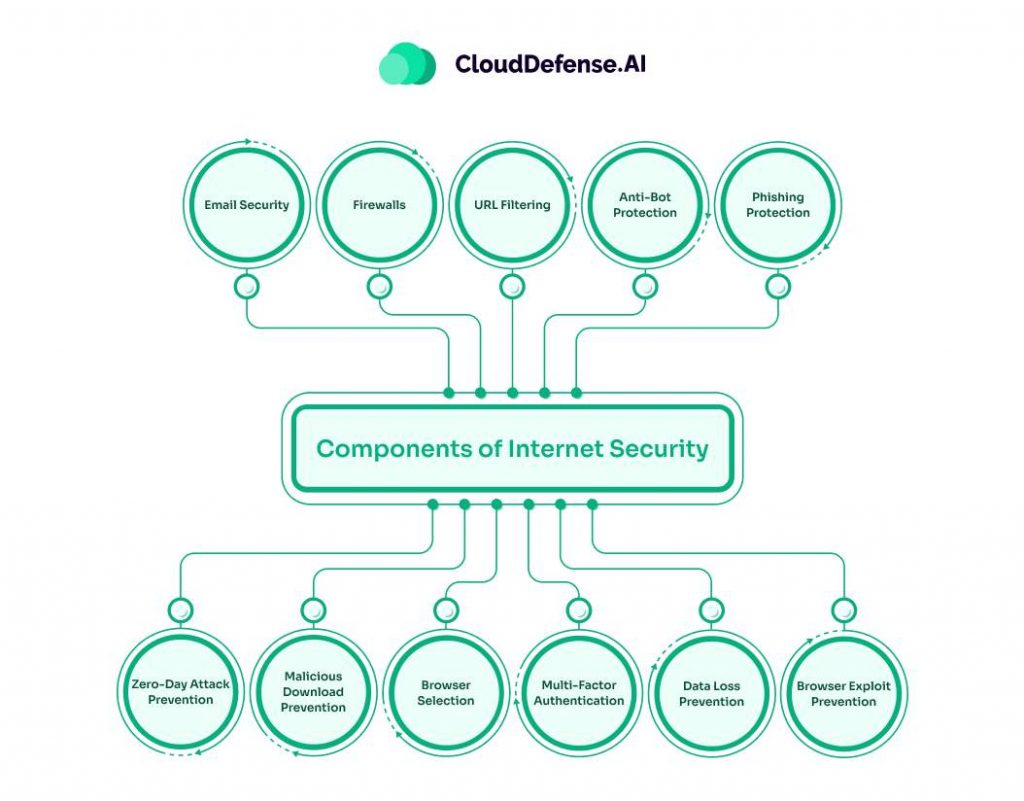
Internet security is not composed of one thing, as it encompasses numerous components that work together to provide comprehensive protection against internet-borne issues, viruses, and threats. Here are the components of Internet security:
Email Security
Email security servers are a crucial component of internet security that make use of various strategies and measures to prevent the email account and communication from being exploited. It safeguards the email account from unwanted access through phishing, spam and other types of cyber threats.
Firewalls
Firewall is one of the primary pillars of internet security of any organization as it filters out the traffic in the network. Firewalls inspect every packet that is moving in and out of the network which includes assessing the information it carries and origin of the packet. When the firewall detects any threat in the package, it is prevented from entry into the network.
URL Filtering
URL filtering is an effective solution that prevents all the employees from visiting websites with malicious URLs from the endpoints of organizations. URL filtering makes sure users from company-owned devices don’t visit known-bad URLs having illegal contents as it can infect the device and hamper productivity. It blocks all the malicious URLs to prevent all possible threats.
Anti-Bot Protection
Malware bot clients are severe threats that can infect all the devices connected to the network. When it infects a device, it starts communicating with other bots and the command center, and this enables the attacker to control all the devices at once. Internet security assesses all the traffic and blocks any malicious traffic that can lead to malware bot infection.
Phishing Protection
Phishing has become a predominant threat to many organizations, and it mostly leads to severe disruption to business operations along with data theft. However, internet security offers optimum protection by utilizing an anti-phishing and email scanning solution to block all possible phishing emails before its employees’ email accounts.
Data Loss Prevention
Data loss prevention plays a crucial role in internet security because it thoroughly scans web traffic for all the sensitive data and prevents them from being intercepted or exposed to the public. Data leaks may happen unintentionally by employees visiting malicious websites that expose all the sensitive data, especially financial and login credentials, but data loss prevention safeguards all data proactively.
Multi-Factor Authentication
To ensure only authorized users can gain entry into the system or endpoint of a network, internet security implements multi-factor authentication. MFA verifies the authenticity of the employee on three parameters: the pin code, password or any detail the user knows, physical token or something the user possesses and any physical attribute like fingerprint.
Browser Selection
Browser selection serves as an effective part of the internet because there are only certain browsers that take protective measures to safeguards all its users. When you select a safe browser, it uses SSL certificates to secure all the connections and ensure users only visit legitimate websites. Importantly, it also makes sure it doesn’t store any cookies after you visit a website like a bank’s website and prevents any user from automatically gaining entry.
Malicious Download Prevention
Employees often accidentally download malicious codes or content from websites or phishing emails. However internet security through sandboxing techniques detect and block all the emails before they reach the network or user. Thus it is able to prevent users from interacting with those malicious websites having downloadable contents and ensure the system is free from threats.
Zero-Day Attack Prevention
Traditional security measures can’t be effective against novel or zero-day attacks as it is unknown to them. However zero-day attack prevention is highly effective against all novel attacks as it can identify them in the system or network and prevent them from making any impact.
Browser Exploit Prevention
When an employee from the company’s endpoint or system visits a malicious site, it can run scripts in the browser. As a result, it can not only exploit any unpatched vulnerabilities but also lead to zero-day attacks. However browser exploit prevention being a component of internet security effectively detects unauthorized execution of code and prevents it.
Final Words
Internet security is a broader concept that takes care of every user’s online activity and safeguards their system from various internet-borne threats. Most of an organization’s devices are connected to the network and a malware infection can hamper the whole network.
Internet security filters out the traffic entering the network and keeps all the assets along with data secured from all kinds of cyber threats. Through this guide we have thoroughly answered your query of what is internet security and also discussed many other information associated with it.

